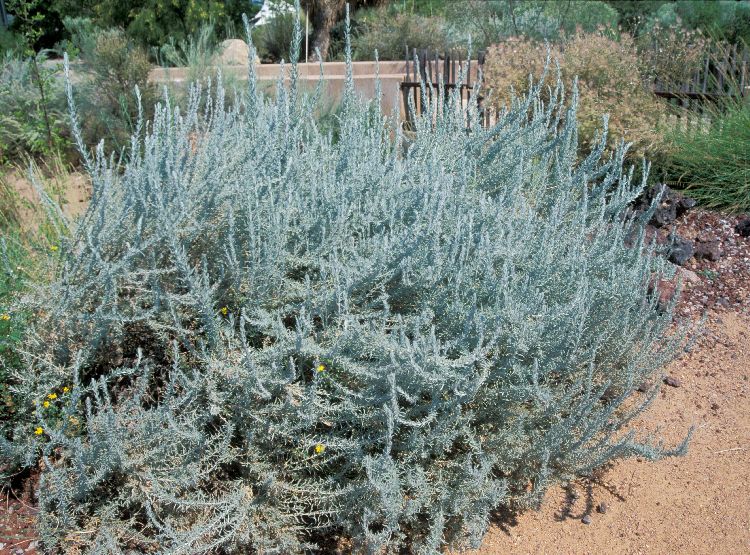
Artemisia filifolia
Silver Sage
Silvery lacy leaves make a nice background to lower-growing flowering plants in the foreground. Canopy coverage: 20 square feet. Photo courtesy Mountain States Wholesale Nursery.
[Read More]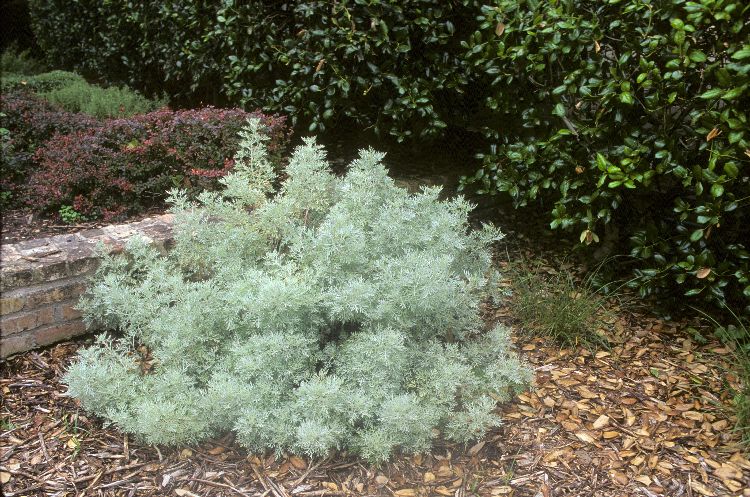
Artemisia frigida
Prairie Sagewort, Fringed Sage
This Artemisia works well as a low, rounded shrub, border along walkways or integrated into a rock garden. Canopy coverage: 3 square feet.
[Read More]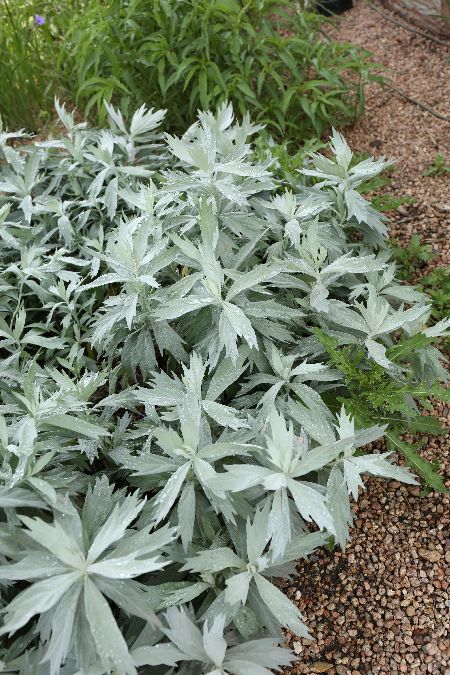
Artemisia ludoviciana
White Wormwood
White Wormwood grows fast, spreading by rhizomes, sometimes becoming invasive. Attractive, aromatic, silvery leaves are borne on slender stems, more of an attraction than the small yellow flowers. Canopy coverage: 3 square feet.
[Read More]Artemisia ludoviciana 'Silver King'
Silver King Artemisia
Silver King Artemisia has a compact growth habit and spreads rapidly. Canopy coverage: 3 square feet.
[Read More]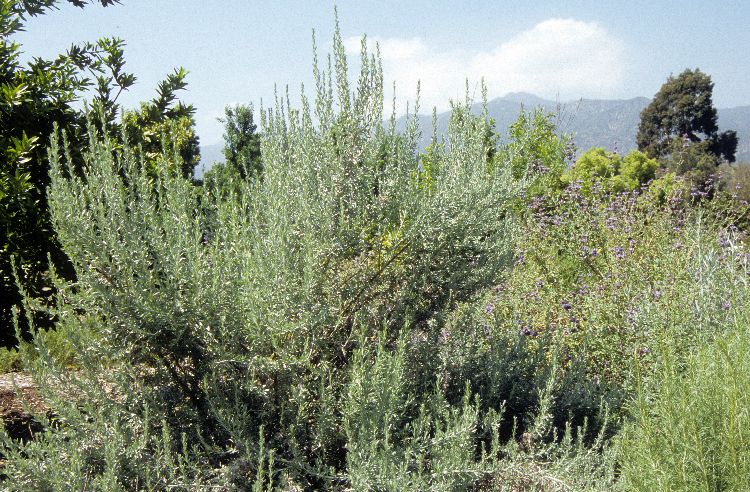
Artemisia tridentata
Bigleaf Sage
Bigleaf Sage has an upright, variable growth habit with distinctive stiff branches. Useful for erosion control on slopes. It is excellent as a wildlife habitat. Plant in soil with good drainage; it does not accept clay soils. Canopy coverage: 20 square feet.
[Read More]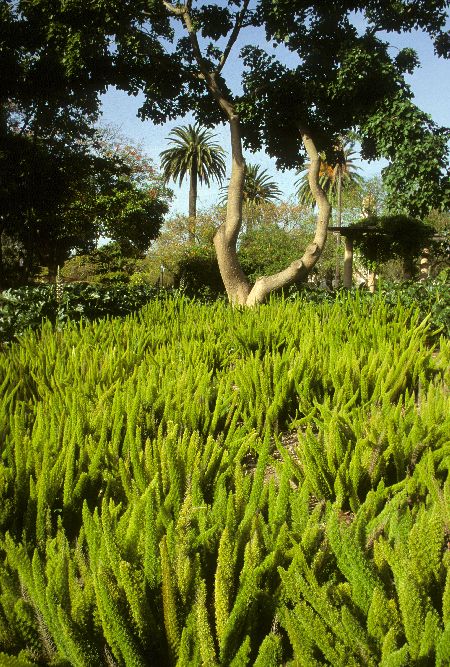
Asparagus densiflorus 'Myers'
Foxtail Fern
The foliage of Foxtail Fern consists of interesting plumes of foxtail-shaped, needlelike leaves. Great container plant. Prefers afternoon shade in hot-summer regions. Canopy coverage: 7 square feet.
[Read More]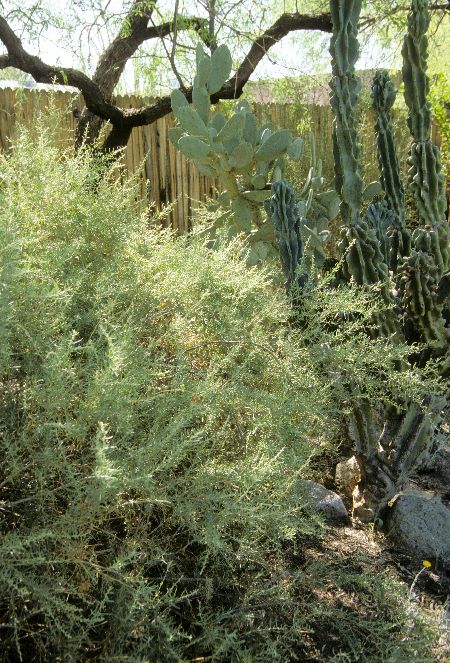
Atriplex canescens
Four-Wing Saltbush
A utilitarian shrub for tough conditions of cold, heat and poor soils. Excellent for revegetation and restoration, as well as for bird cover and habitat. Accepts saline soils. Canopy coverage: 28 square feet.
[Read More]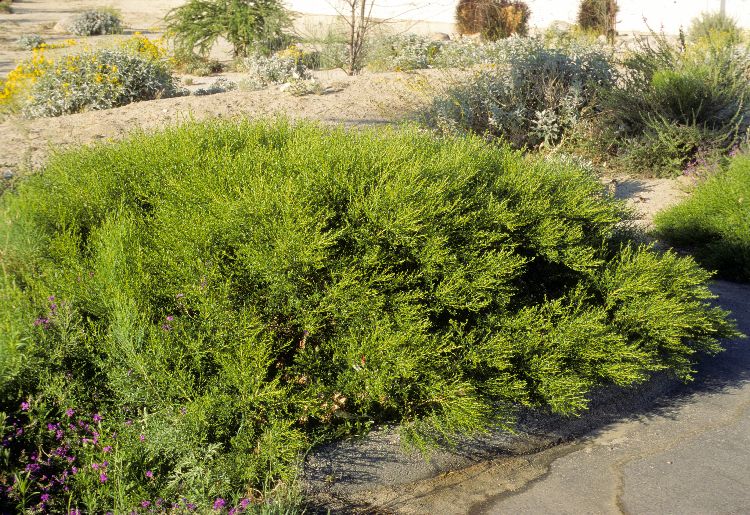
Baccharis x 'Centennial'
Centennial Broom, Coyote Bush
This shrub is a hybrid, with a more uniform appearance compared to the species. It is well-adapted to groundcover duty. A female plant, it does produce the fluff called pappus that can be messy. Canopy coverage: 20 square feet.
[Read More]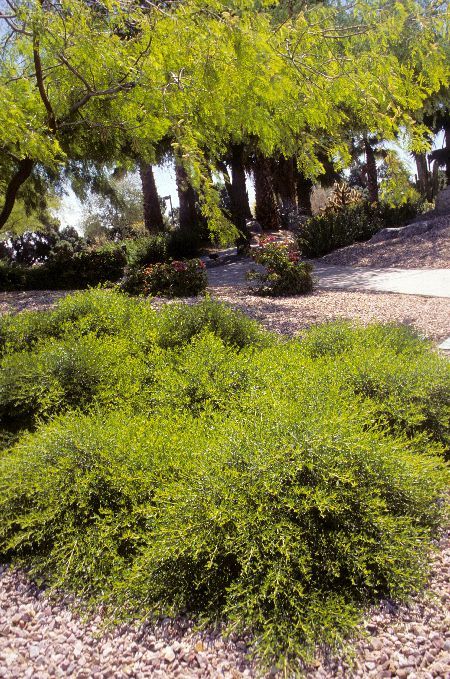
Baccharis x 'Starn' Thompson
Thompson Baccharis
This selection is similar to 'Centennial', but it is a male plant, so it does not produce seed fluff that can sometimes be messy. Cutting established plants back in late winter prior to new growth helps keep plants fresh looking. Canopy coverage: 20 square feet.
[Read More]Baccharis pilularis 'Pigeon Point'
Dwarf Coyote Brush
This selection is a male plant, so it does not produce messy seed fluff. Leaves are larger and lighter green than other Baccharis selections. Cutting established plants back in late winter before new spring growth helps keep plants fresh looking. Reduce summer irrigations as plants become established. Gets by on a couple of irrigations during the warm season but better with once-a-month irrigations in hot summer regions. Canopy coverage: 50 square feet.
[Read More]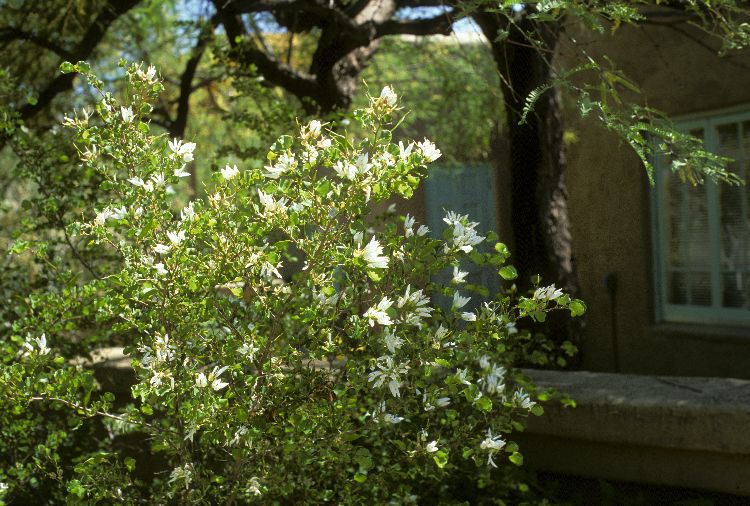
Bauhinia lunarioides
White Orchid Tree
This Bauhinia is more cold hardy than its cousins and is considered to be semievergreen. It is small in stature, which allows its use as a patio tree or flowering shrub tucked into a confined space. Canopy coverage: 28 square feet.
[Read More]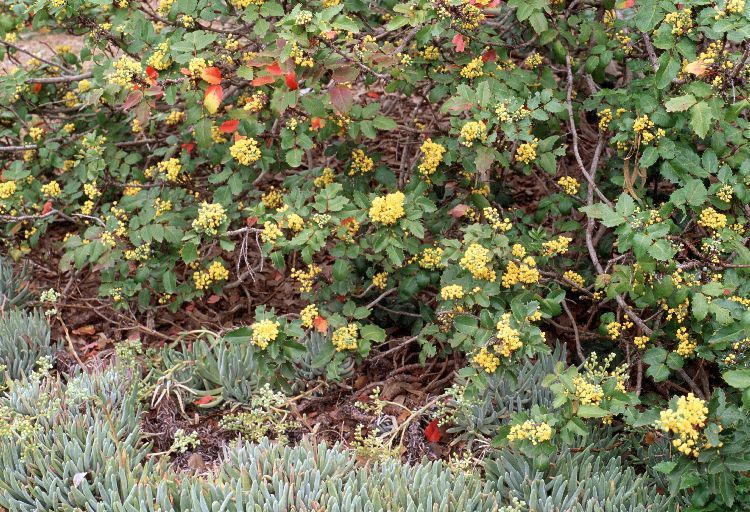
Berberis 'Golden Abundance'
Oregon Grape
Mature size and dense, erect branches of 'Golden Abundance' makes it ideal for a screen or hedge. Well adapted to hot inland regions. It has lots of attributes: bright yellow spring flowers; edible blue berries that attract birds in summer and fall; colorful fall color. Canopy coverage: 28 square feet.
[Read More]Berberis nevinii
Nevin's Barberry
This California native is prized as a background or screen, attracting wildlife, particularly birds, due to the cover and shelter it offers, not to mention red berries in summer. Leaves are composed of leaflets that have sharp spines. It's an adaptable shrub that accepts drought. Canopy coverage: 79 square feet.
[Read More]Berberis thunbergii atropurpurea
Japanese Barberry
Japanese Barberry is a popular shrub with a rounded, graceful form. Best with some protection from the sun in hot summer regions. Branches are spiny so it makes a good barrier plant. Accepts shearing to become a hedge. Enjoy orange to red fall color and red berries in fall and winter. Many selections are available. Accepts sandy to heavy clay soils. Canopy coverage: 28 square feet.
[Read More]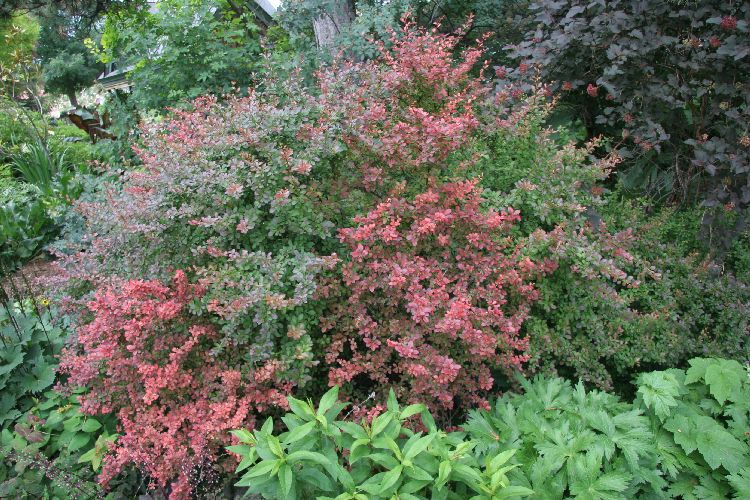
Berberis thunbergii 'Crimson Pygmy'
Crimson Pygmy Barberry
Size and foliage color make this a nice foreground plant. Red berries remain on plant from fall into winter. Best with some protection from the sun in hot summer regions. Canopy coverage: 7 square feet.
[Read More]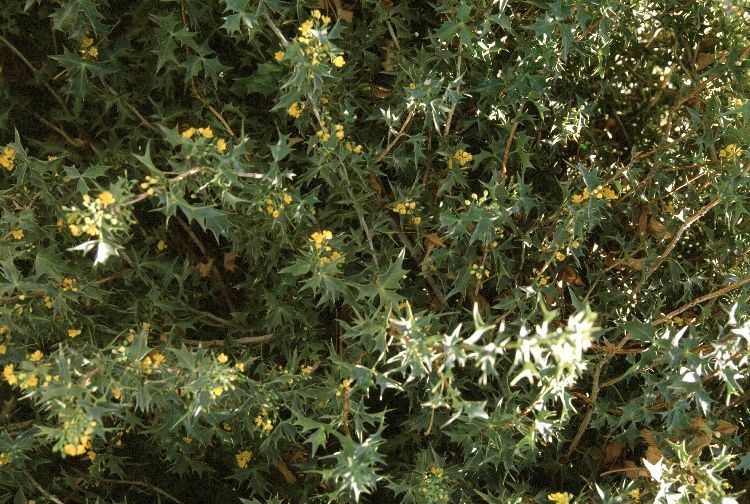
Berberis trifoliata
Desert Barberry
This is a wide-spreading, evergreen shrub, useful for screens and barriers—the sharp, stiff, spiked leaves help make sure of that. Requires little water after plants are established—typically after two summers. Accepts high heat. Bluish black berries follow flowers in late fall and winter. Canopy coverage: 20 square feet.
[Read More]Buddleja alternifolia
Fountain Butterfly Bush
This is a large shrub that can also be trained to become a small tree. Butterflies cannot resist the fragrant flowers. 'Argentea', shown in photos, is an improved selection and a Plant Select plant. Canopy coverage: 113 square feet.
[Read More]Buddleja davidii
Butterfly Bush
Butterfly Bush is a tough, flowering shrub that grows fast to fill an area quickly. Flowers are colorful and fragrant. Canopy coverage: 113 square feet.
[Read More]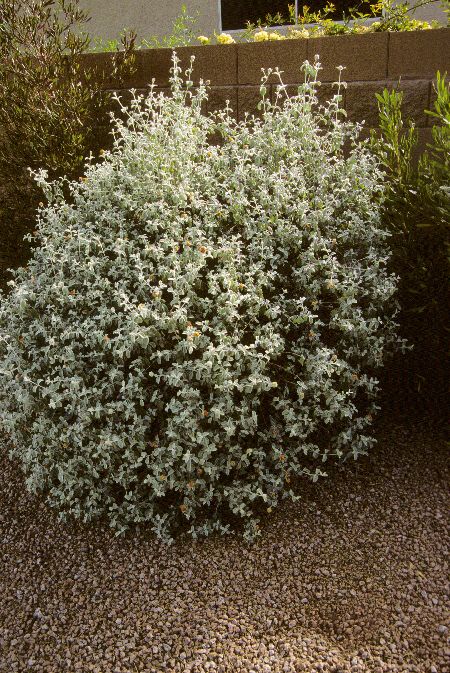
Buddleja marrubifolia
Woolly Butterfly Bush
The silvery leaves of Woolly Butterfly Bush are striking in contrast when placed near green-foliaged plants. Produces distinctive, small, orange, ball-shaped flowers. Canopy coverage: 20 square feet.
[Read More]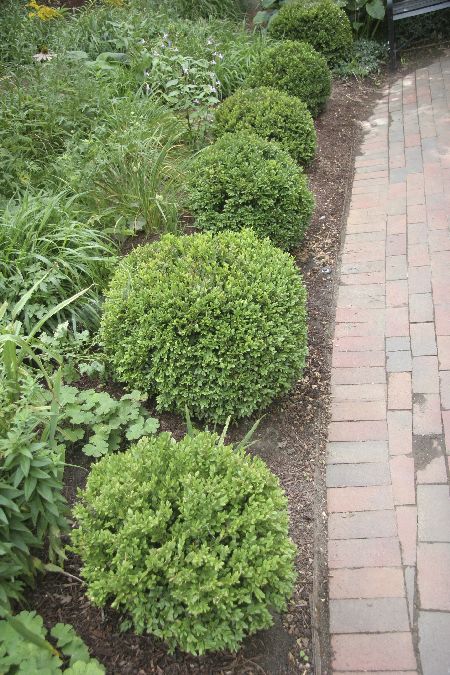
Buxus microphylla var. japonica
Japanese Boxwood
Often grown as a hedge, Japanese Boxwood readily accepts shearing. Best with some protection from the sun in hot summer regions. 'Nana' is a smaller form growing 2 to 4 feet high. Canopy coverage: 28 square feet.
[Read More]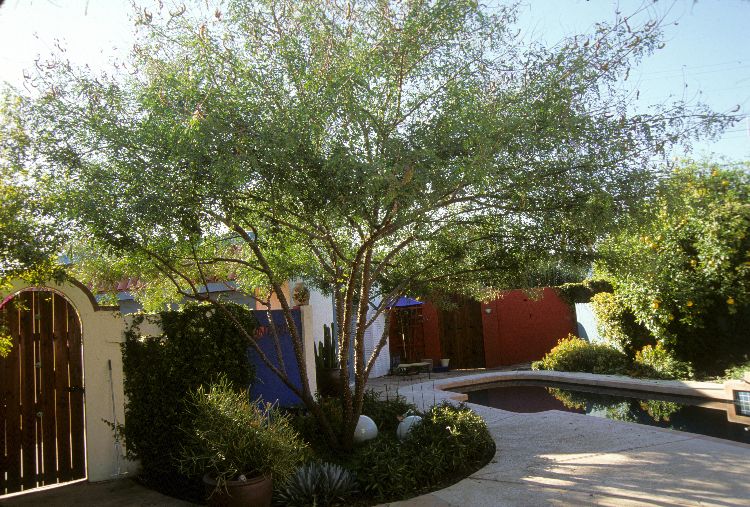
Caesalpinia cacalaco
Cascalote
Cascalote can be trained to become a small, vase-shaped tree. Spike-shaped flowers are profuse winter into spring. Interesting and colorful seed pods follow flowers. Canopy coverage: 177 square feet.
[Read More]